Gaming can be fun, but there’s a growing realization that stepping away from the screen can bring about numerous positive changes.
Quitting or cutting back on video games isn’t just about abandoning a pastime; it’s a choice that can lead to a healthier, more balanced life.
In this article, we’ll explore how leaving the gaming world behind can pave the way for enhanced well-being, improved relationships, and a more fulfilling lifestyle.
Here are the 5 benefits of quitting video games:
- Enhanced Sleep Quality
- Better Concentration
- Higher Academic Achievement
- Improved PosturePositive
- Impact on Eyesight
[toc]

Benefit 1: Improved Physical Health
Engaging in prolonged video gaming often leads to a sedentary lifestyle. This lifestyle has adverse effects on heart health, increasing the risk of diabetes, elevated blood pressure, and high cholesterol as reported by Valleywise Health.
In the same way, the absence of physical activity can result in muscle stiffness, poor circulation, and a heightened risk of chronic conditions.
To counter these effects, stepping away from the gaming console and integrating regular exercise into daily routines can bring about improvements in cardiovascular fitness, increased muscle strength, and overall enhanced physical well-being.
Benefit 2: Enhanced Sleep Quality
The blue light emitted by screens, a common feature of video games, can disrupt the body’s natural circadian rhythm and melatonin production.
Melatonin is a hormone that regulates sleep-wake cycles, and its suppression by blue light can result in difficulties falling asleep.
Research has shown concerns that it can also cause insomnia in the longer term. Therefore, making a conscious effort to fix your sleep schedule is advisable.
By reducing screen time, especially before bedtime, individuals allow their bodies to naturally wind down, facilitating the production of melatonin and promoting better sleep quality.
Benefit 3: Increased Productivity
Playing video games can use up a lot of time that could be spent on more useful activities.
Instead of spending hours on games, people can use that time for work, learning, or hobbies. This can make them feel more accomplished and get more things done.
Whether it’s improving at work, learning new things, or doing things they like, people can use their time for things that help them in their personal and professional lives.
This change can make their life more satisfying and meaningful, with real results from using their time and effort wisely.
Benefit 4: Better Concentration
Constant exposure to the fast-paced and visually stimulating nature of video games can impact attention span and concentration levels.
A study suggests that excessive screen time can lead to difficulty focusing and even ADHD-like symptoms in children.
Breaking the habit allows individuals to regain control over their focus.
This can be particularly advantageous in academic and professional settings, where the ability to concentrate for extended periods is actually required.
As individuals develop the discipline to resist the distractions of gaming, they often find an increased capacity to engage deeply with their work, leading to higher-quality results and a more satisfying sense of achievement.
Benefit 5: Enhanced Social Skills
Video games, especially those played online, may provide a form of social interaction, but they can limit face-to-face communication skills.
However, it can impair emotional comprehension, promote aggressive behavior, and hinder social and emotional competence as mentioned by the National Institutes of Health.
Quitting video games encourages individuals to engage more actively in real-world social situations, encouraging the development of better communication skills.
Talking to people in person requires understanding body language, listening carefully, and caring about others—things that might not happen much in video games.
Getting better at these social skills can make friendships and work connections stronger, making your social life more enjoyable.
Benefit 6: Greater Emotional Stability
Playing video games often brings strong emotions, from the excitement of winning to the frustration of losing. These constant ups and downs can create a rollercoaster of feelings that might affect overall emotional stability.
A recent study by Fox29 found that kids with more screen time had an 11% higher risk of behavior problems like aggression or inattention.
By stopping video games, people can avoid these emotional swings, leading to a more balanced emotional state. This stability can have positive effects on daily life, relationships, and mental well-being.
As individuals step back from emotionally intense virtual experiences, they may discover greater resilience in handling real-world challenges, promoting a more stable and emotionally healthy lifestyle.
Benefit 7: Financial Savings
Playing video games, buying consoles, and making in-game purchases can cost a lot of money. People who really like gaming often spend a bunch on the newest gear and extras.
If they stop playing video games, they can use that money for smarter things.
They can save it for important stuff, create an emergency fund, or work towards big-money goals. This helps make their overall money situation more stable.
Benefit 8: Improved Relationships
Playing a lot of video games can strain relationships by taking up time that could be spent with loved ones. Quitting video games lets people spend more time and attention on building stronger connections with family and friends.
Whether it’s doing things together, having meaningful talks, or just being there for each other, these improved connections create a more satisfying and supportive social network, which positively affects overall well-being.
Research published in the Journal of Marriage and Family indicates that families who spend more time together tend to report higher levels of overall life satisfaction.
Benefit 9: Reduced Stress
Playing games, especially in competitive settings, can make people feel stressed and tense.
Quitting video games can bring a more relaxed lifestyle, taking away the constant pressure from virtual challenges.
Taking a break from intense gaming lets people relax, handle stress better, and develop healthier ways to deal with challenges.
This helps improve mental well-being and brings a more balanced approach to daily issues.
Benefit 10: Higher Academic Achievement
The time commitment required for gaming can interfere with academic responsibilities.
Students addicted to online games generally have lower academic achievement motivation due to a lack of precise academic planning and motivation, as highlighted by Frontiers in Psychology.
By reducing gaming time, individuals create space for focused studying and academic pursuits. This can lead to improved academic performance as they give more time and energy to coursework, research, and exam preparation.
The result is a positive impact on grades and a better foundation for future educational and career opportunities.
Benefit 11: Increased Physical Activity
Video game sessions often involve prolonged periods of sitting, contributing to a sedentary lifestyle. Quitting video games provides individuals with the opportunity to engage in physical activities and exercise.
Whether through sports, outdoor recreation, or fitness routines, increased physical activity promotes better health and contributes to an overall sense of well-being.
Benefit 12: Better Time Management
Frequent gaming can take up a lot of time, sometimes neglecting other responsibilities. Quitting video games can encourage individuals to reevaluate their priorities and enhance their time management skills.
By organizing their schedules more effectively, individuals can find a balance between work, personal pursuits, and leisure activities, creating a more structured and satisfying daily routine.
Benefit 13: Improved Posture
Extended periods of gaming can lead to poor posture, as individuals may slouch or hunch over during gameplay.
According to research from City Physiotherapy, as little as 5 minutes of gaming can result in poor posture—slouching into a rolled and rounded shoulder position with a forward head position to keep eyes on the screen.
Quitting video games provides an opportunity to address and improve overall physical posture.
This involves being more conscious of sitting or standing correctly, which can positively impact spinal alignment, reduce strain on the back and neck, and contribute to better musculoskeletal health.
Benefit 14: Enhanced Self-Discipline
Overcoming the urge to play video games requires self-discipline, a valuable skill that can be transferred to other areas of life.
The ability to resist the temptation of gaming and prioritize other responsibilities or activities fosters a sense of self-control.
This newfound self-discipline can positively influence work habits, personal relationships, and the pursuit of long-term goals.
Benefit 15: Improved Decision-Making Skills
Making decisions in real life is different from the challenges posed by video games.
By quitting video games, individuals can focus on improving their decision-making skills in actual situations, whether personal or professional.
This shift can lead to better critical thinking, improved problem-solving abilities, and enhanced decision-making skills in real-world scenarios.
Benefit 16: Reduced Risk of Gaming Addiction
Quitting video games can help break the cycle of gaming addiction and prevent associated negative outcomes.
Gaming addiction may lead to social isolation, neglect of responsibilities, and adverse effects on mental health.
This addiction causes individuals to spend increasing amounts of time playing video games to experience the same level of enjoyment, as mentioned by the Cleveland Clinic.
By choosing to quit, individuals take a proactive step toward regaining control over their lives.
Benefit 17: Increased Creativity
Video games, though enjoyable, often confine creativity to their virtual worlds. Quitting them creates room for exploring new hobbies and activities, nurturing creativity.
Whether it’s painting, writing, or other artistic pursuits, diverse activities stimulate the brain and encourage innovative thinking.
This broadening of creative outlets can result in personal growth, self-expression, and the discovery of hidden talents.
Benefit 18: Heightened Awareness
The immersive nature of video games can create tunnel vision, limiting awareness of the surrounding environment. Quitting video games helps individuals break free from this tunnel vision, becoming more mindful and aware.
Heightened awareness contributes to a richer and more present daily experience. Whether appreciating nature, observing urban details, or connecting socially, increased mindfulness enhances the overall quality of life.
This shift can lead to a deeper connection with the world and a greater appreciation for the present moment.
Benefit 19: Development of Real-Life Skills
Video games, though entertaining, might not translate into practical real-life skills. DiYES International School emphasizes finding the right balance between screen time and real-life experiences for children’s development and well-being.
Quitting or reducing gaming allows individuals to redirect their time toward acquiring and honing practical skills like cooking, DIY projects, or learning new skills for personal or professional development.
These real-life skills not only add tangible value to daily living but also foster a sense of accomplishment and self-sufficiency.
They contribute to personal growth, applicable across various aspects of life, enhancing overall competence and confidence.
Benefit 20: Positive Impact on Eyesight
Extended periods of screen time, common in gaming, can contribute to eye strain and potential long-term issues.
With video gaming, you generally don’t tend to look away as much compared to when looking at digital devices. It forces the eyes to remain focused on constantly moving graphics, which can cause difficulty focusing on other objects, even after playing. (source)
Quitting or reducing video game time leads to reduced screen exposure, contributing to better eye health.
This reduction in eye strain can alleviate discomfort, dryness, and fatigue. Additionally, it may contribute to the prevention of conditions associated with prolonged screen use, such as digital eye strain or myopia.
By prioritizing eye health, individuals can maintain better vision, reducing the risk of complications and ensuring long-term visual well-being.
Quitting Video Games Benefits FAQs
Is it good to quit video games?
Quitting video games can be beneficial for individuals seeking a more balanced lifestyle.
It allows for the reallocation of time and focus to other activities, potentially leading to personal growth and improved well-being.
What are the benefits of leaving games?
Leaving video games can bring various benefits, including enhanced physical health, improved sleep quality, increased productivity, better concentration, and the development of real-life skills.
It can also positively impact mood and social skills.
What happens after quitting video games?
After quitting video games, individuals may experience positive changes in their lifestyle, such as increased physical activity, better sleep patterns, improved focus on other tasks, and a potential shift towards more constructive and fulfilling activities.
What are the positive effects of video games for game quitters?
Game quitters may experience positive effects such as improved mental health, increased social interactions, enhanced creativity, and the development of new skills as they redirect their time and energy toward other pursuits.
Are games good for your brain?
Video games can have both positive and negative effects on the brain.
Some games promote cognitive skills such as problem-solving, spatial awareness, and strategic thinking.
However, excessive gaming or certain types of games may have negative impacts on mental health and cognitive function.
What are the disadvantages of video games?
Disadvantages of video games can include sedentary behavior leading to health issues, the potential for addiction, exposure to violent content, and the risk of social isolation.
Excessive gaming may also interfere with academic or professional responsibilities.
What is the impact of video game addiction?
Video game addiction can lead to a range of negative consequences, including impaired social relationships, declining academic or work performance, physical health issues, and mental health challenges such as anxiety and depression.
What are the positive and negative effects of online gaming?
The positive effects of online gaming can include social interaction, teamwork, and strategic thinking.
However, negative effects may involve addiction, exposure to inappropriate content, and the potential for cyberbullying or online harassment.
Do video games have positive or negative impacts on mental health, yes or no, and why?
The impact of video games on mental health can vary.
While some games may have positive effects, such as stress relief and cognitive stimulation, excessive gaming or certain game genres may contribute to negative outcomes, including addiction and mental health issues.
It’s essential to balance gaming with other healthy activities for overall well-being.

